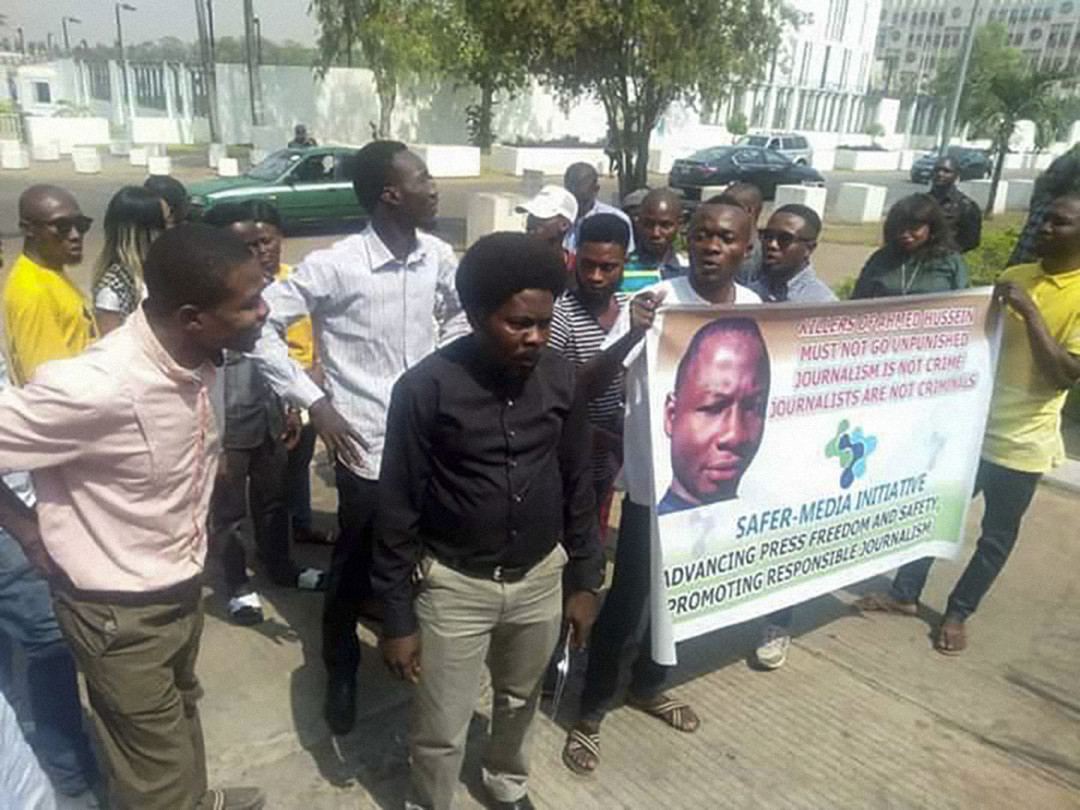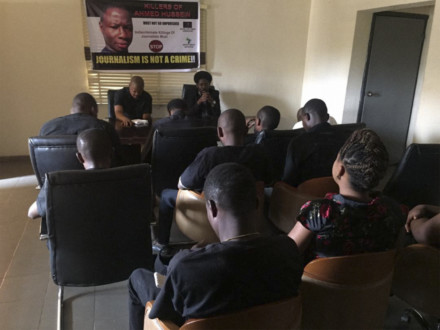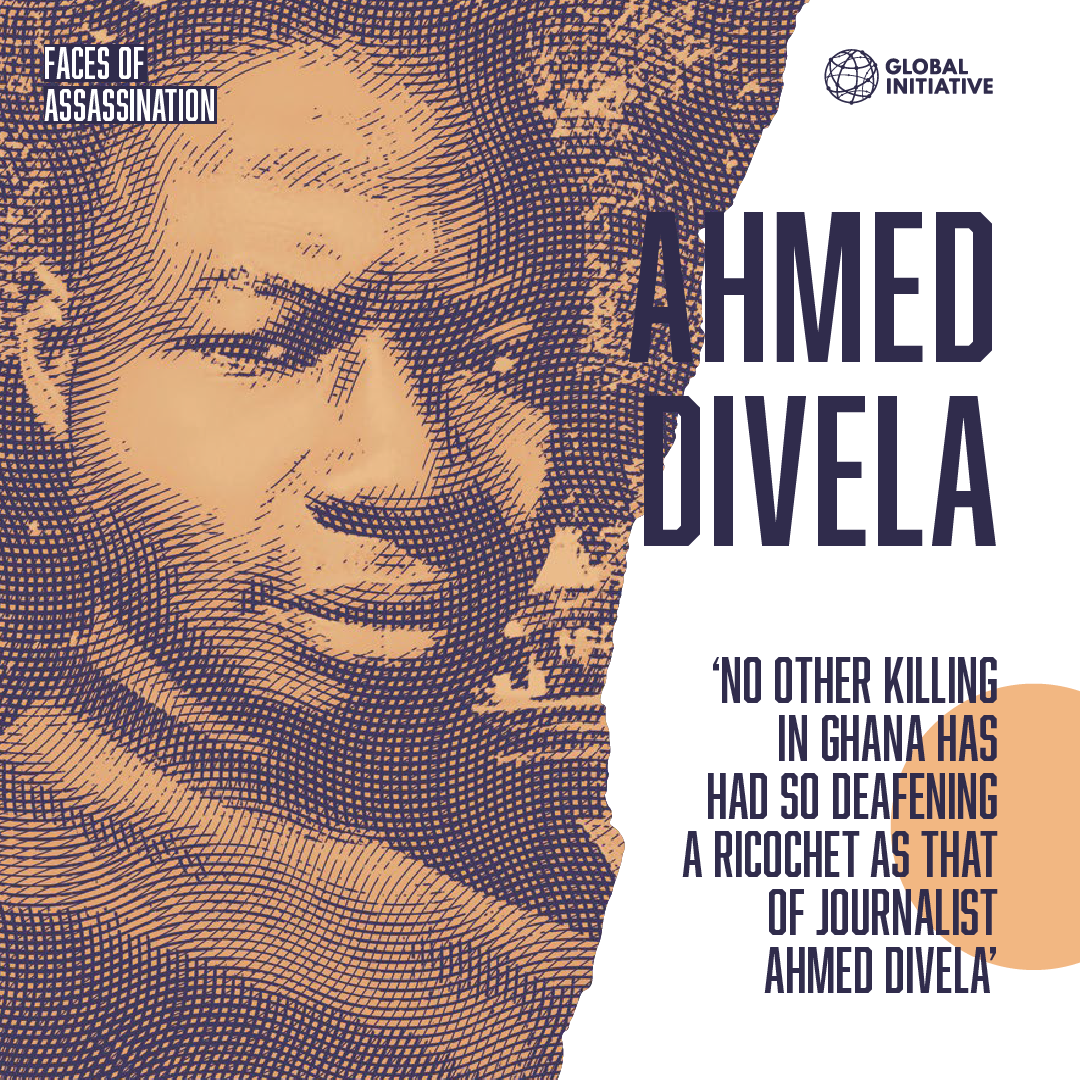16 January 2019
Accra, Ghana
Ahmed Divela
Profession
Media
Motive
Exposure of illegal activity


Adolfo Olivas


Ahmed Divela


Amit Jethwa


Artan Cuku


Babita Deokaran


Bayo Ohu


Berta Cáceres


Bhupendra Veera


Bill Kayong


Boris Nemtsov


Boško Buha


Chai Boonthonglek


Charl Kinnear


Chut Wutty


Chynybek Aliev


Cihan Hayirsevener


Daphne Caruana Galizia


Darío Fernández


Derk Wiersum


Deyda Hydara


Édgar Quintero


Edmore Ndou


Edwin Dagua


Federico Del Prete


Fernando Villavicencio


Gezahegn Gebremeskel


Gilles Cistac


Habibur Mondal


Igor Alexandrov


Jacob Juma


Ján Kuciak


Javier Valdez


Joannah Stutchbury


José Ángel Flores


Jules Koum Koum


Kem Ley


Luis Marroquín


Mahamudo Amurane


Marcelo Rivera


María Elena Ferral Hernández


Marielle Franco


Milan Pantić


Milan Vukelić


Muhammad Khan


Nelson García


Nihal Perera


Oliver Ivanović


Orel Sambrano


Perween Rahman


Peter R. de Vries


Rajendra Singh


Salim Kancil


Sandeep Sharma


Sikhosiphi Radebe


Slaviša Krunić


Soe Moe Tun


Victor Mabunda


Virgil Săhleanu


Wayne Lotter


Yuniol Ramírez


Zezico Guajajara
16 January 2019
Accra, Ghana
Profession
Media
Motive
Exposure of illegal activity
With the exception of the public execution of corrupt state administrators by the military government of Jerry Rawlings in 1979, no other killing in Ghana has had so deafening a ricochet as that of journalist Ahmed Hussein-Suale Divela. Grabbing media headlines and dominating public discourse in cities and far-flung villages alike, everyone is talking about the man who lived and worked in the shadows, but whom death transformed into a public hero.
On the night of 16 January 2019, two men on a motorbike trailed a blue BMW, zipping through the streets and roads of Madina, a suburb of the Ghanaian capital, Accra. As the motorbike levelled with the car, a gun was fired at the driver, forcing him to swerve and crash the car into a roadside store. One of the men then calmly walked up to the BMW and fired two more shots at the man behind the wheel. Then, turning to face the motley crowd watching from a distance, he smiled and raised a finger to his lips.
Because the gunmen did not appear to be in a hurry to make a getaway, many of the people in the crowd concluded that what they had just witnessed was the shooting of a midnight film scene by some quirky director from Ghana’s movie industry. But there was no camera crew and no lighting technician directing his floodlight at the dimly lit scene. The gunmen disappeared, and the crowd inched closer to the car, with its shattered left window. The man behind the wheel was dead. This was no movie; the blood was real.
Jonas Nyabor, a journalist with Ghana’s Citi FM, said that Divela’s killers were without a doubt paid assassins. ‘Obviously, they were trained marksmen who shot with military precision. They did not waste any bullets. All three shots hit their targets: one to the neck, the others to the chest. And they did not take any valuables from the victim to suggest robbery. They left no one in doubt about who they were, or what their mission was. Honestly, I cringe every time knowing that the victim was a journalist, like me. He did not deserve such a gruesome end,’ Nyabor said.
Divela, 31 years old when he was killed, was a native of Wulensi, a Muslim-community village about 400 kilometres north of Accra. After graduating with a degree in political science from the University of Ghana in 2012, he chose the tough and dangerous turf of investigating organized-crime groups as a career path. This he pursued in the manner of a supercop. Divela’s biggest influence was Anas Aremeyaw Anas, an internationally acclaimed Ghanaian undercover reporter whose work has been acknowledged by the likes of Barack Obama.
Divela was a determined apprentice, quickly learning the ropes at Anas’s undercover outfit, Tiger Eye, which had achieved renown for its exposure of human-trafficking syndicates, corruption and abuses in a state-owned psychiatric hospital. Divela was part of the team behind Tiger Eye’s Spirit Child, an investigative documentary that exposed a ring of voodoo priests who made a living branding disabled children as evil spirits to be cast out of society.
Unfazed by high-risk conditions, Divela was known for never allowing anything to stand between him and a big story. In a pained remark following the killing, Anas acknowledged Divela’s position as second-in-command of the team that pulled off two of Tiger Eye’s most successful assignments – ‘Ghana in the Eyes of God’ and ‘Number 12’.
‘Ghana in the Eyes of God’, a 2015 undercover investigation of the country’s criminal-justice system, caught on camera 30 judges and dozens of judicial officials accepting bribes for helping to subvert the course of justice. Seven high-court judges were exposed and suspended as a result.
‘Number 12’ blew the whistle on corrupt football referees across Africa who had taken bribes to fix matches. A number of Ghanaian referees and Kwesi Nyantakyi, head of the Ghanaian Football Association, were caught accepting money from Tiger Eye journalists posing as intermediaries. In addition to Nyantakyi, who was banned from football for life, the sting implicated 77 referees and 14 officials. Buoyed by their success in Ghana, the undercover team took their cameras into several other African countries, including Kenya, the Gambia and Nigeria, where investigations revealed a similar situation of endemic bribery.

Journalists in Nigeria march for Ahmed Divela

Mourners share a minute’s silence
In the wake of Divela’s assassination, fingers are being pointed by and at different enemy camps. Some people are willing to bet their last cedi that the assassination was arranged by the African football community, where organized-crime groups are fast taking over the sports-betting business. Match-fixing, the influencing of sponsorship deals and the bribing of officials are just some of the rackets accompanying an industry marred by fake football academies and fake agents, who steal fortunes from rich and poor families alike in exchange for the promise of getting their sons a place in the European League.
In September 2018, Divela had informed the Committee to Protect Journalists that his life was in danger. Kennedy Agyapong, a member of parliament for the country’s ruling New Patriotic Party and owner of the Ghanaian television station Net 2 TV, had appeared on television calling on his supporters to attack Divela as punishment for his role in the football exposé, at the same time releasing a photograph of the undercover reporter and thus unveiling his identity. Four months earlier, Agyapong had made another angry television appearance, this time on Adom TV, where in the course of his outbursts, he drew his forefinger across his neck in a throat-slitting gesture.
It is clear that despite being neither a football referee nor a high-court judge, Agyapong harboured much anger towards Divela. And the police said that they have invited the MP for ‘informal questioning’, despite his having made public statements distancing himself from the murder. In response to an email enquiry about the state of the investigation into Divela’s death, Samuel Appiah Darko, a lawyer representing Tiger Eye, said: ‘Police investigations can best be described as slow. Nothing tangible has come up so far.’
At the time of writing, the Ghana Police Service was yet to find the smoking gun. In February 2019, Assistant Commissioner of Police David Eklu disclosed that six people had been arrested in connection with Divela’s murder. According to police, the suspects, who remain unnamed, were interrogated and their statements taken before they were released on bail. Eklu said that in addition to the six suspects, the police had given statement forms to Agyapong, Nyantakyi and Anas, ‘all suspects in the case’. No progress report on the investigation has been provided by the police since.
August 2021 update:
In July 2021, media reports on the status of high-profile murders in Ghana informed that two of Divela’s mobile phones had been sent to the US in 2020 for extraction of information, but the amount of data was still being analyzed and investigations were ongoing. In an interview given to the Committee to Protect Journalists, Darko said that Tiger Eye had sued Agyapong for defamation over his comments about the ‘Number 12’ documentary, but the lawsuit was still in progress.

With the exception of the public execution of corrupt state administrators by the military government of Jerry Rawlings in 1979, no other killing in Ghana has had so deafening a ricochet as that of journalist Ahmed Hussein-Suale Divela.


23 August 2021
Johannesburg, South Africa
Babita Deokaran


20 September 2009
Akowonjo, Lagos State, Nigeria
Bayo Ohu


18 September 2020
Cape Town, South Africa
Charl Kinnear


16 December 2004
Kanifing, Gambia
Deyda Hydara


22 April 2017
Beitbridge District, Zimbabwe
Edmore Ndou


21 April 2018
Johannesburg, South Africa
Gezahegn Gebremeskel


3 March 2015
Maputo, Mozambique
Gilles Cistac


5 May 2016
Nairobi, Kenya
Jacob Juma


15 July 2021
Kiambu, Kenya
Joannah Stutchbury


4 November 2011
Yaoundé, Cameroon
Jules Koum Koum


4 October 2017
Nampula, Mozambique
Mahamudo Amurane


22 March 2016
Mbizana, Eastern Cape, South Africa
Sikhosiphi Radebe


10 January 2018
South Africa
Victor Mabunda


16 August 2017
Dar es Salaam, Tanzania
Wayne Lotter